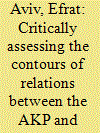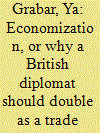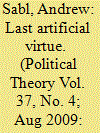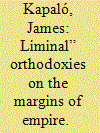|
|
|
Sort Order |
|
|
|
Items / Page
|
|
|
|
|
|
|
| Srl | Item |
| 1 |
ID:
192273


|
|
|
|
|
| Summary/Abstract |
In Turkey’s increasingly authoritarian context, which minimizes any serious chance of making political gains, challenging common conceptions of political power may expand our understanding of power dynamics. This article draws upon historical perspectives to track the power dynamics and political relations of religious movements inside and outside the legitimate forms of politics in Turkey. It provides insights into how political power is being reframed through religious movements and vice versa. It also examines the history of Turkey’s religious movements and their relationship with the government since 1925. It also discusses how the state-religion relationship has changed since the rise of the Justice and Development Party (Adaletve Kalkınma Partisi, AKP) and the 2016 coup attempt. It presents a case study of Furkan Vakfı and its leader, Alparslan Kuytul, who vehemently opposed the government and is now regarded as a threat by Erdoğan and the AKP.
|
|
|
|
|
|
|
|
|
|
|
|
|
|
|
|
| 2 |
ID:
125028


|
|
|
|
|
| Publication |
2013.
|
| Summary/Abstract |
FOREIGN POLICY cannot remain frozen; it is as fluid as any other sphere of social relations. Indeed, at different stages of human history, wars, national and religious movements, technical innovations, and scientific discoveries triggered changes in world politics. In the last five years, global economy gradually recovering from the world crisis which began in 2008 has been a catalyst of such changes. Economic problems which have not yet left the stage affected and continue to affect the UK foreign policy.
|
|
|
|
|
|
|
|
|
|
|
|
|
|
|
|
| 3 |
ID:
090133


|
|
|
|
|
| Publication |
2009.
|
| Summary/Abstract |
David Hume's position on religion is, broadly speaking, "politic": instrumental and consequentialist. Religions should be tolerated or not according to their effects on political peace and order. Such theories of toleration are often rejected as immoral or unstable. The reading provided here responds by reading Hume's position as one of radically indirect consequentialism. While religious policy should serve consequentialist ends, making direct reference to those ends merely gives free reign to religious-political bigotry and faction. Toleration, like Hume's other "artificial virtues" (justice, fidelity to promises, allegiance to government), is a universally useful response to our universal partiality-as Established uniformity, however tempting, is not. This implies that toleration can progress through political learning, becoming broader and more constitutionally established over time. A sophisticated Humean approach thus shares the stability and normative attractiveness of respect- or rights-based arguments while responding more acutely and flexibly to problems the former often slights: antinomian religious extremism; underdefined political agency; and internationalized, politicized religious movements.
|
|
|
|
|
|
|
|
|
|
|
|
|
|
|
|
| 4 |
ID:
152477


|
|
|
|
|
| Summary/Abstract |
In the 20th century, the Russian Orthodox Church, the Romanian Orthodox Church, and the Soviet atheist state each pursued missions that attempted to transform Moldovans into loyal and trustworthy subjects and to integrate them into new state structures. This article explores the “liminal” character of Moldovan identities forged on the Russian and Romanian borderlands through the prism of Moldova's “home-grown” religious movements. Grass-roots movements led by charismatic and “trickster” religious figures “played” with dichotomies of the hidden and the revealed, innovation and tradition, and human and divine, succeeding in transforming the subject positions of whole segments of Moldovan peasant society. The resulting forms of “liminal” Orthodoxy have proved enduring, perpetually critiquing and transgressing canonical norms from the margins and subverting the discourses and narratives that seek to “harmonize” identities and to consolidate nation, state, and church in the Republic of Moldova.
|
|
|
|
|
|
|
|
|
|
|
|
|
|
|
|
|
|
|
|
|